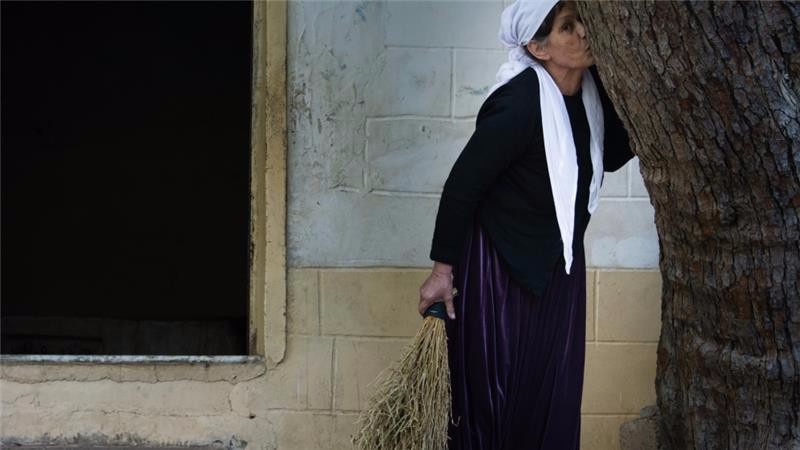 Many members of the Yazidi religious minority in Iraq, fearing persecution, are choosing to migrate to Germany.
Many members of the Yazidi religious minority in Iraq, fearing persecution, are choosing to migrate to Germany.
Taylor Smith | 20 Feb 2016 07:05 GMT | al jazeera
According to human rights workers, Iraq was originally home to 800,000 Yazidis, but just 450,000 remain today [Taylor Smith/Al Jazeera]
Lalish – Deep in the mountains of Iraq’s Kurdish region lies a sanctuary for the Yazidis, a religious minority that has been viciously persecuted by the Islamic State of Iraq and the Levant (ISIL).
Lalish, which means both silence and listen, is the oldest Yazidi temple in the world. Usually quiet and peaceful, the temple has more recently become a refuge for internally displaced Yazidis who fled ISIL’s advance on the city of Sinjar in 2014.
Although Kurdish forces have expelled ISIL from Sinjar, many Yazidis displaced from the city have no plans to return.
“In five years there won’t be any Yazidis left here,” said Najim Aleas Abdi, a Yazidi general fighting with the Peshmerga, a Kurdish armed group battling ISIL.
READ MORE: Yazidis long for home as Sinjar operation stalls
According to the Yazidi Human Rights Organisation, Iraq was originally home to 800,000 Yazidis, but just 450,000 remain today.
For Iraq’s Yazidis, horrors of past refuse to go away
Much of this is due to emigration. Abdi’s oldest son lives in Germany, and he plans to take the rest of his family there soon. “No family is complete here. Everyone has brothers and sisters in Germany,” Abdi told Al Jazeera.
The dream is shared by many Yazidis.
“I will either be eaten by the fish or make it to Germany,” said Ziad Shangar, who is originally from Sinjar. Shangar said he planned to cross the Mediterranean Sea next month, and travel onwards to Germany. For the time being, he works as a volunteer at the tomb of Sheikh Adi, a Yazidi saint.
Shangar says he has found a German woman on Facebook who is willing to marry him, and he is confident it will all work out.
It is estimated that 50,000 Yazidis are living in Germany.
“The Yazidis aren’t fleeing just Iraq; they are fleeing their homeland, where their holy city, Lalish, is located -which to them is the equivalent of Saudis having to flee Mecca,” said Kyle Msall, a University of Chicago PhD candidate with expertise on the crisis facing Yazidis.
Yazidi culture is so intertwined with their religion that it seems “unfathomable” for them to leave this area, where their religion has been for centuries, Msall said.
READ MORE: A year after ISIL attack, Yazidis ‘will never forget’
Over scalding tea in Lalish’s mountainside temple, which is used for worshipping the sun, four Yazidi men discussed the possibility of a better life in Germany and their concerns about returning to Sinjar.
I will either be eaten by the fish or make it to Germany.
Ziad Shangar, Iraqi Yazidi
Luqman Mahmood, a native of Mosul, now works as a teacher at a high school in Sheikhan, Iraq. He said most of his students refuse to shake his hand because they liken his religion to devil worship.
This misconception stems from the link between the devil and Tausi Melek, the Peacock Angel believed to have been created by God to reign over the universe. The Peacock Angel is identified as a fallen angel, but is not the devil in Yazidism.
Mahmood said that on one occasion, students appreciative of his help pulled him aside after school to offer a sign of their gratitude. They told him that he would go to hell for being Yazidi, but that they would help him convert to save his soul.
“We don’t have a problem with people. But people have a problem with us,” Mahmood told Al Jazeera.
The persecution of Yazidis predates the rise of ISIL, but has increased in recent years. In 2007, two Yazidi communities were reduced to rubble by bombings that killed 500 people and displaced more than 1,000 families.
“When families feel their children will have no future, that’s when they choose to leave. The aggregate situation for all children in Iraq is extremely troubling – including Yazidis,” said Karim Elkorany, a spokesperson for UNICEF’s Iraq branch.
According to Msall, “Many individual Yazidis believe that everyone wants the Yazidis gone from the Middle East, so the option for Europe seems like best-case scenario in their opinion.”Qasim Hussein, a local Kurdish translator, has applied to go to Germany legally. Asked whether he would consider himself a refugee, he vehemently shook his head, saying Iraq is still home. “But if you get slaughtered and killed, what’s the point? We have to let go,” he said.
After tea, the Yazidi men walked through Lalish towards a baptismal pool. Only Yazidis may enter the room surrounding the baptismal pool, and an old woman guards the entrance to enforce this rule. She said that 10 families had visited the holy site on a recent day before making the dangerous journey to Europe.
In colder weather, the price charged by smugglers to bring families to Europe drops by thousands of dollars, and families who previously could not afford the risky journey have been jockeying to secure spots.
Source: Al Jazeera















